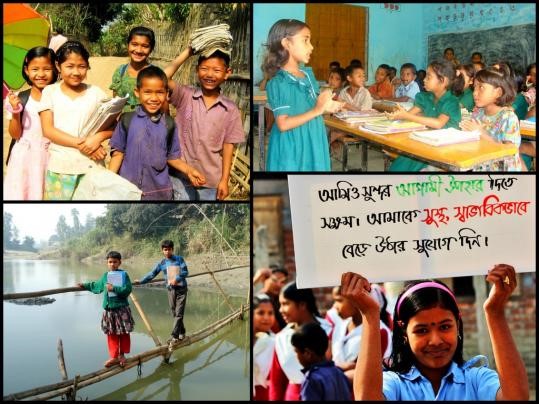

I recently attended a dialogue on Tax Redistribution and Education Financing. The outcome of the dialogue was pretty inspirational. The National Front of Teachers and Employees (NFTE) and Initiative for Human Development jointly organised the dialogue session on September 17at the National Press Club marking the Education Day supported by few other organisations including ActionAid Bangladesh.
It is greatly inspiring to see that relevant stakeholders have gradually started to realise the importance of increasing allocation in the public services like education and health sector through progressive taxation. Education experts are repeatedly bringing the key facets of this burning issue at the forefront at different dialogues and expressing solidarity in support of the demand which was reverberated in the dialogue of Sept 17. Chair of the National Front of Teachers and Employees (NFTE) Mr. Kazi Faruque Ahmed, Chair of the National Education Coalition Rasheda K. Choudhury, former Chair of National Board of Revenue (NBR) Mr. Abdul Mazid, hundreds of Teachers’ Union members and leaders took part in the introductory dialogue to kick off the movement in demand of progressive taxation and more spending in education.

The issue has also drawn attention of the policy actors for its significance. Honorable Minister for education Mr. Nurul Islam Nahid attended the meeting and asserted the government’s commitment towards the issue.
ActionAid and other development organisations have long been advocating for better allocation in the public services through redistribution of Tax and holding the state accountable to ensure this. For any country, especially the LDCs like Bangladesh, Tax revenue is a sustainable source of financing the key public services such as education and health. Governments usually prefer to use tax revenue, rather than depending on donors’ aid or loans to cover the public expenses for example hiring new teachers, paying teachers’ salaries because it is a relatively secure and predictable source. So, there is no alternative but to raise money domestically through expanding the national tax base which is in fact the main source of revenue for the governments.
Progressive and pro-poor taxation help attain the key social objective of redistribution, enables governments to invest more in education, creates equitable access and improves quality of education. On the other hand equal access to quality education also generates redistributive opportunities for citizens, which basically support the low-income groups more directly, since education as a “public good” is likely to benefit all individuals largely equally over the long run, enhancing human capital, productivity and income capabilities.
It was indeed a good beginning in terms of ushering in the dialogues involving the teachers’ union members around tax revenue and strengthening the domestic financing base. Prior to the discussion session a human chain was also formed demanding the right to quality education for all, separate pay scale for teachers, statutory permanent education commission, national commission for teachers’ recruitment and fair share of tax revenue and increase of allocation to education
I would like to conclude here quoting Thomas Picketty as he aptly said that “economic and political changes are inextricably entwined” therefore, as responsible citizens we all must take a “serious interest in money, its measurement, the facts surrounding it and its history.”
Mustn’t we?